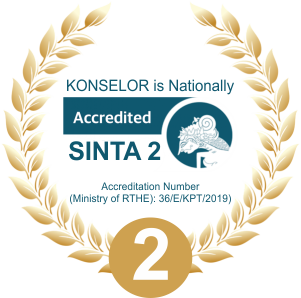Bimbingan Akademik untuk Mereduksi Perilaku Menyontek Siswa Madrasah Tsanawiyah
 ),
), (1) Universitas Pendidikan Indonesia
(2) Universitas Mathla'ul Anwar Banten
 Corresponding Author
Corresponding Author
Copyright (c) 2017 Elis Ajizah, Mualwi Widiatmoko
DOI : https://doi.org/10.24036/02017648116-0-00
Full Text:
 Language : id
Language : id
Abstract
Academic guidance to reduce the cheating behavior of Madrasah Tsanawiyah students. This research is motivated by the cheating problem experienced by some of the students when facing test or repetition, if the behavior of cheating is left protracted, then the behavior will become a habit to form a dishonest person. The purpose of this study to obtain a general description of the behavior of students who cheat as a foundation in the preparation of academic guidance programs to reduce the cheating behavior of learners. This research uses a quantitative approach with descriptive research method with total population of 155 students in class VIII MTs. Rijalul Hikam Jatinagara academic year 2014/2015 using saturated samples. (2) The validation result according to BK that the academic guidance program service is feasible to be used to reduce cheating behavior. The recommendation of this research is an academic guidance program to reduce cheating behavior of learners can be used as an alternative of guidance and counseling services in overcoming the problems of learning, especially to reduce the cheating behavior of learners.
Keywords
References
Ahmadi, A. (1991). Bimbingan dan penyuluhan di sekolah. Semarang:Toha Putra.
Anderman, E.M., &Murdock, T.B. (2007). Psychology of academic cheating. New York: Academic Press.
Arikunto, S. (2006). Prosedur penelitian. Jakarta: Rineka Cipta.
Cholila, Nur. (2011). Hubungan antara konsep diri dengan perilaku menyontek pada siswa SMP Satya Dharma Desa Balung Lor Kecamatan Balung Kabupaten Jember. Skripsi pada Fakultas Psikologi UIN Malang: Tidak Diterbitkan.
Hartanto, D. (2012). Bimbingan dan konseling menyontek. Jakarta: Jakarta.
Josephson Institute. (2012). Josephson institute’s 2012 report card on the ethics of American youth. [Online]. Available at: http://charactercounts.org/pdf/reportcard/2012/ReportCard-2012-DataTables-HonestyIntegrityCheating.pdf.[20 Maret 2014].
Magnus, J.R. et. al. (2002). Tolerance of cheating: An analysis Across Countries. Journal of Economic Education. 125-135.
McCabe, D. (2005). Cheating: Why students do It and how we can help them stop. In A. Lathrop, K. Foss (Eds.), Guiding students from cheating and plagiarism to honesty and integrity: Strategies for change (pp. 237-246). USA: Libraries Unlimited.
McCabe, D. L., Trevino, L. K., & Butterfield, K. D. (2001). Cheating in academic institutions: A decade of research. Ethics &Behavior, 11(3), 219-232.
Mujahidah. (2009). Perilaku menyontek laki-laki dan perempuan: Studi meta analisis. Jurnal Psikologi, 2(2), 177-199.
Musa, A., Ismail, J., & Ladisma, M. (2010). Undergraduates’ethical behaviour. International Journal of Humanities and Social Science, 5(2), 297-302.
Nurhidayati, E. (2017). Pedagogi konstruktivisme dalam praksis pendidikan Indonesia. Indonesian Journal Of Educational Counseling, 1(1), 1-14.
Poedjinoegroho, Baskoro E. (2006). Guru profesional, biasa menyontek melahirkan koruptor. [Online]. Available at:http://ilman05.blogspot.com[15 Januari 2015].
Prayitno, E. A., & Amti, E. (2004). Dasar-dasar bimbingan dan konseling. Jakarta: Rineka Cipta.
Salahudin, A. (2010). Bimbingan dankonseling. Bandung: Pustaka Setia.
Sukardi, D. K. (2002). Pengantar pelaksana program bimbingan dan konseling di sekolah. Jakarta: Rineka Cipta.
Tibbetts, S. G. (1999). Differences between women and men regarding decisions to commit test cheating. Research in Higher Education, 40(3), 323-342.
Whitley, B. E. (1998). Factors associated with cheating among college students: A review. Research in higher education, 39(3), 235-274.
Whitley, B. E., Nelson, A. B., & Jones, C. J. (1999). Gender differences in cheating attitudes and classroom cheating behavior: A meta-analysis. Sex Roles, 41(9-10), 657-680.
Woolfolk, A. (2009). Educational psychology. Boston: Allyn and Bacon.
 Article Metrics
Article Metrics
 Abstract Views : 1082 times
Abstract Views : 1082 times
 PDF Downloaded : 305 times
PDF Downloaded : 305 times
Refbacks
- There are currently no refbacks.
Copyright (c) 2017 Elis Ajizah, Mualwi Widiatmoko

This work is licensed under a Creative Commons Attribution 4.0 International License.







